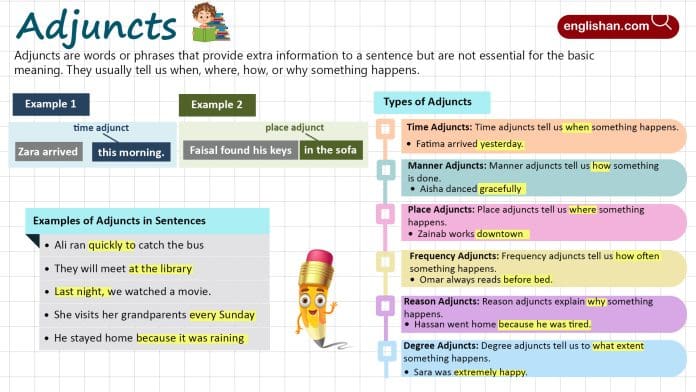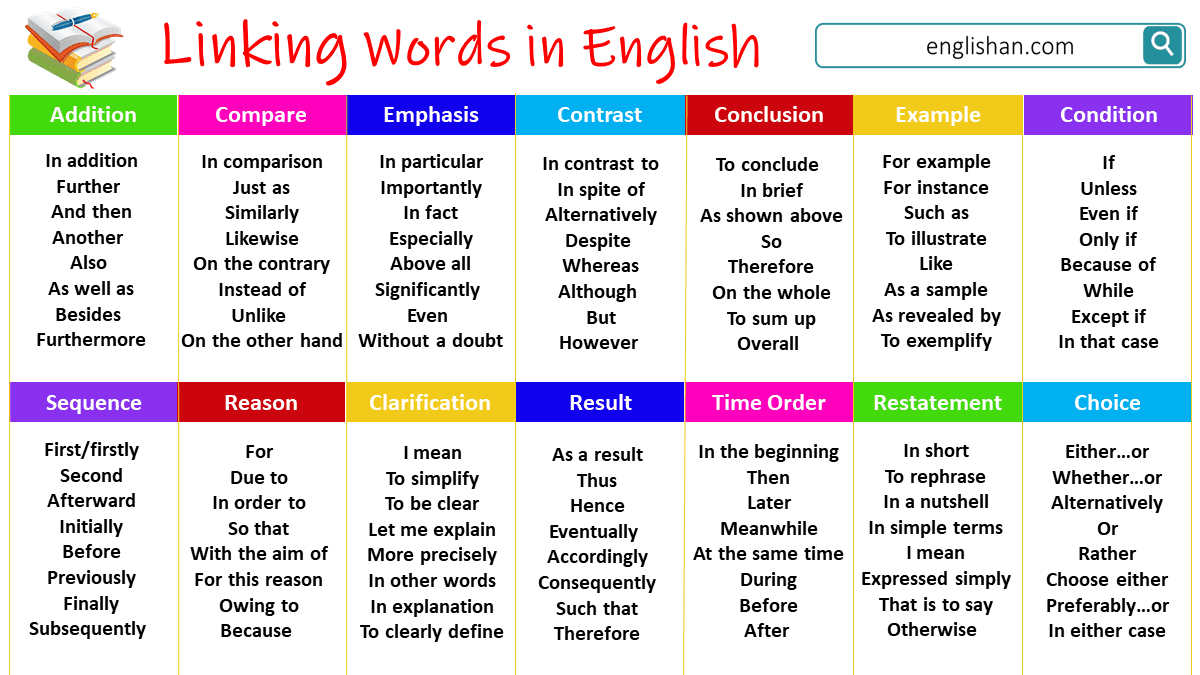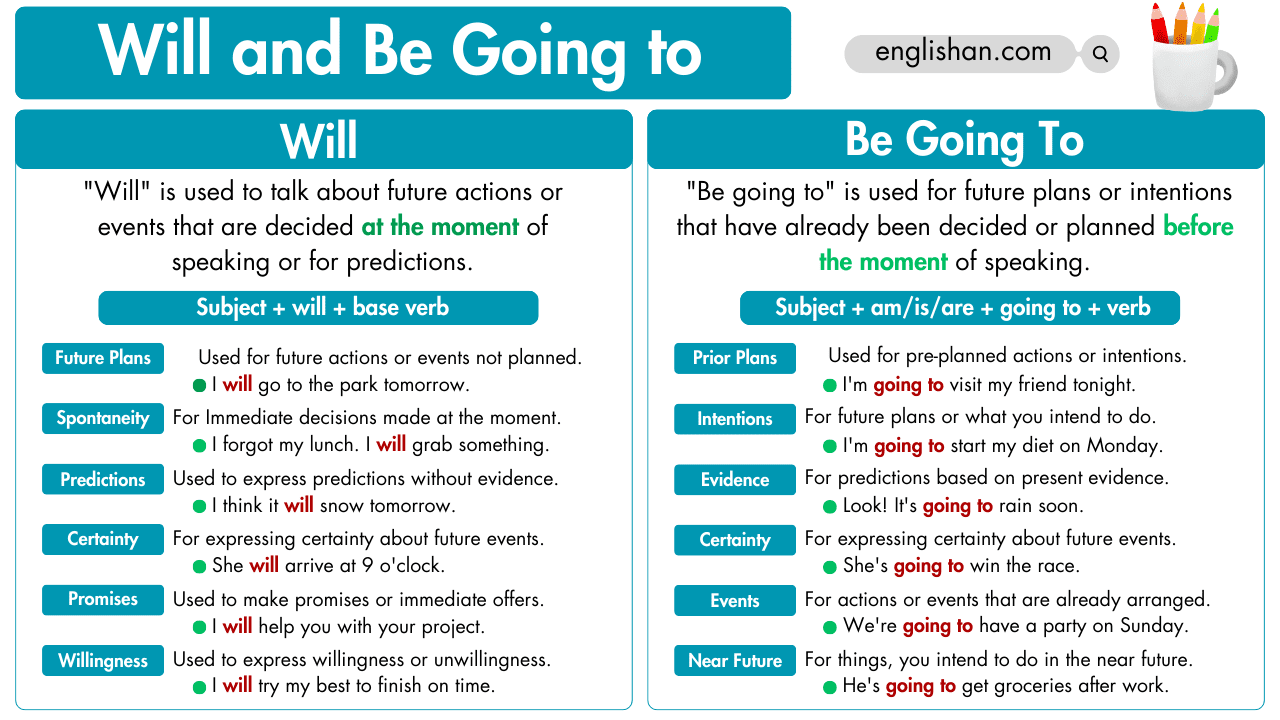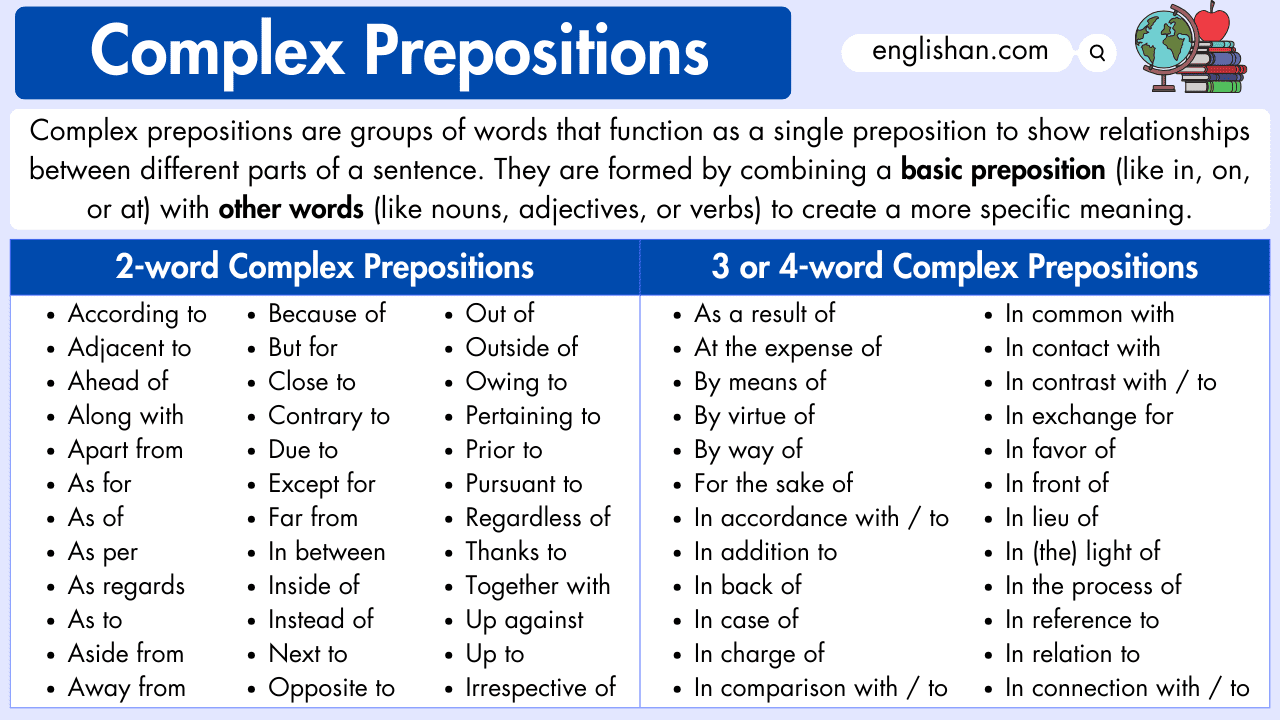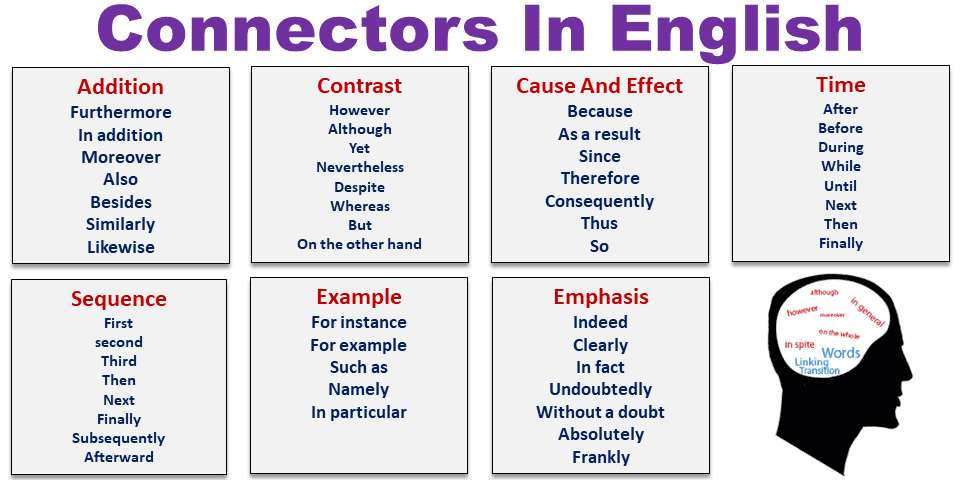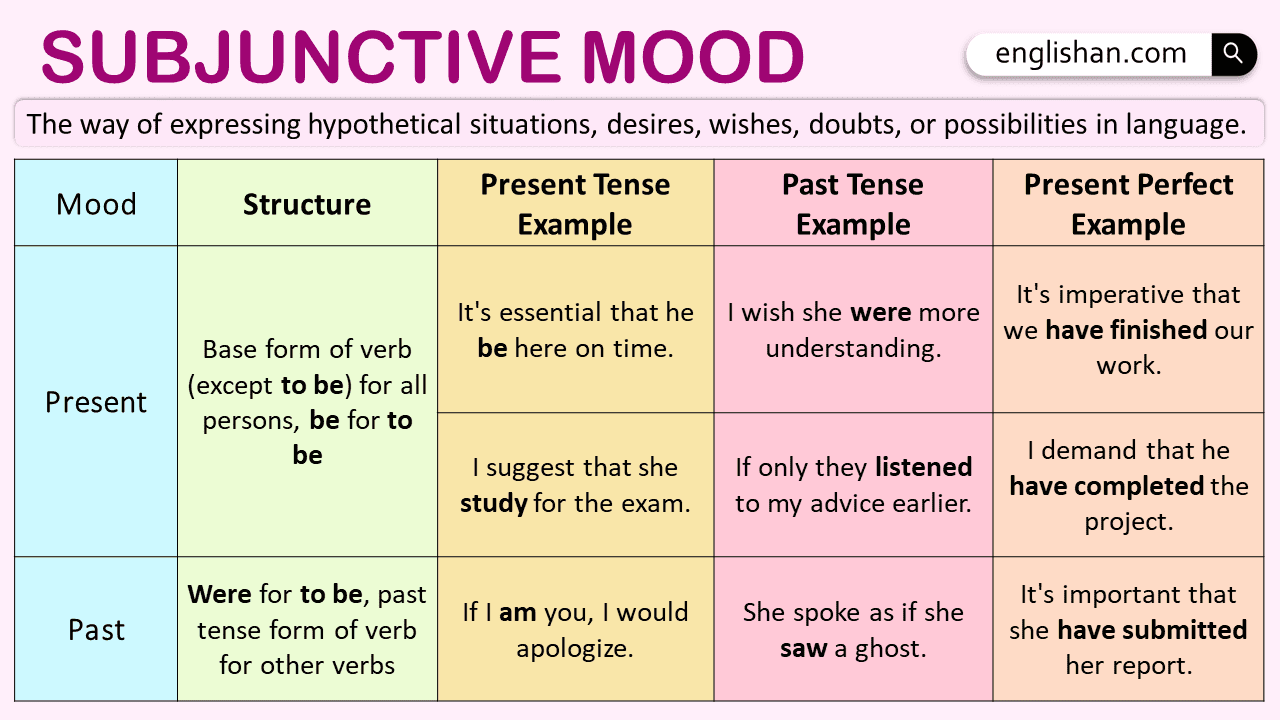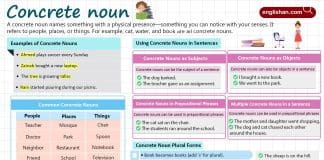Contents
Adjuncts are an important part of English grammar that help us add more details to our sentences. They give information about time, place, manner, and more, making our communication clearer and more interesting. Whether you’re just starting to learn grammar or want to improve your skills, understanding these elements can make your writing and speaking much stronger.
What Are Adjuncts?
Adjuncts are words or phrases that give extra information to a sentence but are not needed for the basic meaning. In other words, if you take out these parts, the sentence still makes sense, but some details are missing. They usually tell us when, where, how, or why something happens.
In grammar, an adjunct is often an adverb or adverbial phrase that adds context, like details about time, place, manner, frequency, or reason. These elements make sentences more interesting and provide additional information.
Types of Adjuncts
There are different types based on the kind of information they give. Let’s look at each type in detail.
Time Adjuncts (Adverbs of Time)
Time-related phrases tell us when something happens. They answer questions like “When did this happen?” or “For how long?”
Examples:
- Fatima arrived yesterday. → The word yesterday tells us when Fatima arrived.
- Bilal will call you next week. → The phrase next week tells us when Bilal will call.
Manner Adjuncts (Adverbs of Manner)
Manner-related phrases tell us how something is done. They often end in “-ly” and answer the question “How did this happen?”
Examples:
- Aisha danced gracefully. → The word gracefully tells us how Aisha danced.
- Ahmed spoke loudly during the meeting. → The word loudly tells us how Ahmed spoke.
Place Adjuncts (Adverbs of Place)
Place-related phrases tell us where something happens. They answer questions like “Where did this happen?”
Examples:
- The children are playing in the park. → The phrase in the park tells us where the children are playing.
- Zainab works downtown. → The word downtown tells us where Zainab works.
Frequency Adjuncts (Adverbs of Frequency)
Frequency-related phrases tell us how often something happens. They answer questions like “How often does this happen?”
Examples:
- Omar always reads before bed. → The word always shows how often Omar reads.
- Samira usually takes the bus. → The word usually tells us how often Samira takes the bus.
Reason Adjuncts (Adverbs of Reason)
Reason-related phrases explain why something happens. They answer questions like “Why did this happen?”
Examples:
- Hassan went home because he was tired. → The phrase because he was tired explains why Hassan went home.
- Maryam stayed late to finish her project. → The phrase to finish her project tells us why Maryam stayed late.
Degree Adjuncts (Adverbs of Degree)
Degree-related phrases tell us to what extent something happens. They give information on how much or to what degree something happens.
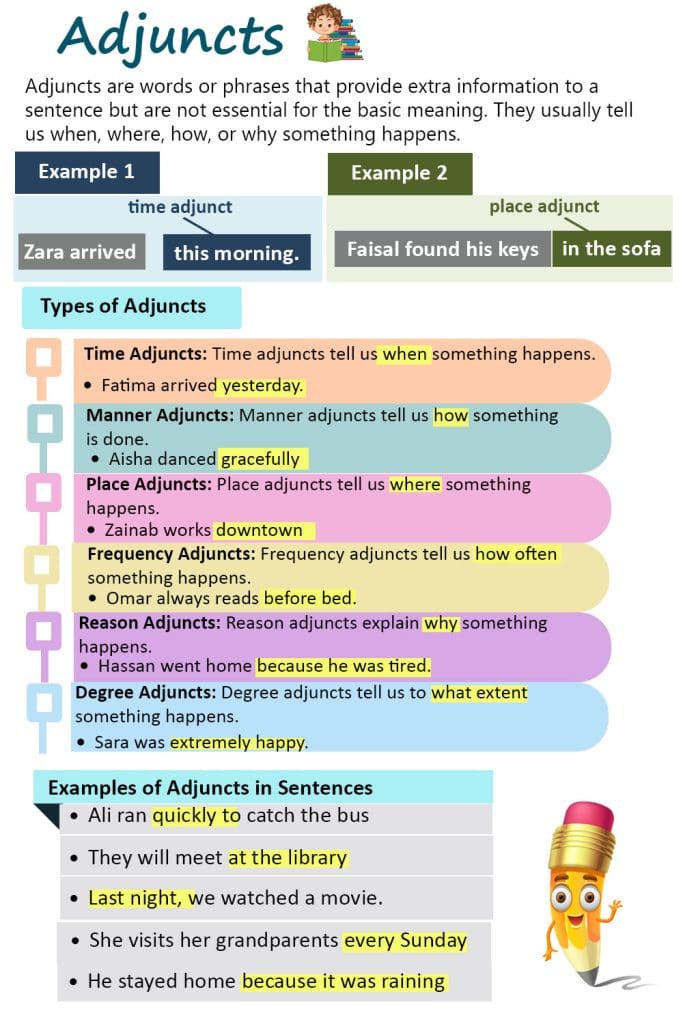
Examples:
- Sara was extremely happy. → The word extremely tells us how happy Sara was.
- Khalid was quite busy today. → The word quite tells us how busy Khalid was.
Use in Sentences
These elements are flexible and can be used in different parts of a sentence. They can be at the beginning, middle, or end of a sentence, depending on what we want to emphasize.
Examples:
- Tomorrow, I will visit my grandmother. (Time phrase at the beginning) → The word tomorrow tells us when the action will happen.
- Layla worked carefully on her assignment. (Manner phrase in the middle) → The word carefully tells us how Layla worked.
- We will meet at the restaurant. (Place phrase at the end) → The phrase at the restaurant tells us where the meeting will happen.
Placement in Sentences
These phrases can appear at the beginning, middle, or end of a sentence, depending on what is emphasized. Let’s look at examples of each placement:
Beginning Placement
- Yesterday, Fatima arrived at the airport. → The phrase yesterday is placed at the beginning to emphasize when the action happened.
Middle Placement
- Fatima often visits her grandmother on weekends. → The word often is placed in the middle to indicate how frequently Fatima visits her grandmother.
End Placement
- Fatima arrived at the airport yesterday. → The phrase yesterday is placed at the end to add information about when the action happened.
Summary
These grammatical elements are useful tools in English that let us give more information about actions. By understanding the different types—like time, manner, place, frequency, reason, and degree—you can make your sentences more detailed and interesting. They make our conversations and writing clearer and more enjoyable.
FAQs:
Adjuncts are words or phrases in a sentence that add extra information, such as when, where, how, or why something happens. They are not essential to the sentence’s main meaning, but they provide more detail.
1. Adverbial Adjuncts
2. Prepositional Phrase Adjuncts
3. Noun Phrase Adjuncts
4. Adjective Phrase Adjuncts
Determiners are words that come before nouns to give more information. Here are the types:
1. Articles: Show if something is specific or general.
Example: The, A, An
2. Demonstratives: Point to things.
Example: This, That, These, Those
3. Possessives: Show ownership.
Example: My, Your, His, Her
4. Quantifiers: Tell how much or how many.
Example: Some, Any, Many, Few
5. Interrogatives: Ask questions.
Example: Which, What, Whose
6. Distributives: Talk about things one at a time.
Example: Each, Every, Either, Neither
An adjunct of manner tells us how something is done. It usually describes the way an action happens.
Examples:
She sang beautifully.
(“Beautifully” tells us how she sang.)
He runs fast.
(“Fast” tells us how he runs.)
It helps give more detail about the action.
Read More
